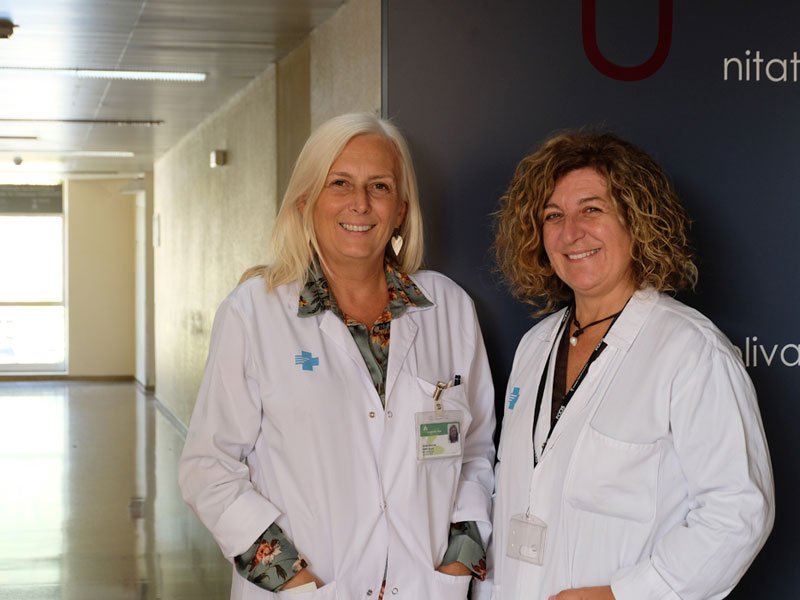New insights into the mechanisms of how tolerogenic therapies reduce aggressive immune activity in treatments for auto-immune and inflammatory diseases

The Immunopathology research group with the Immunology service and the Multiple Sclerosis Unit at the Germans Trias i Pujol Hospital and Institute continue their research to develop treatments for multiple sclerosis (MS). Their latest paper published in Frontiers of Immunology, examines the mechanisms by which vitamin D3-dendritic cells are used to alter a patient's own lymphocytes so they can be used to inhibit autoimmune responses.
The complexity of the immune system means that slight changes can lead to the body's immune system attacking its own cells, which causes diseases such as diabetes, rheumatoid arthritis, allergies or multiple sclerosis, amongst others. Treatments can damage the immune system leading to patients being very vulnerable to infections they would normally easily resist. In recent years tolerogenic therapies have been developed in which the patients own dendritic cells are removed from blood and altered so that instead of attacking a patient's cells they damp down the immune response and train it to tolerate the body's own cells again; these therapies have fewer side-effects. This is one of the main lines of research that the Immunopathology Research group, led by Dr Eva Martínez-Cáceres at the IGTP, has been pursuing for many years. Many clinical trials have been carried out world-wide and one is currently ongoing at the IGTP and the Germans Trias i Pujol Hospital. Despite excellent results from many of these trials, including some that hint that they could lead to disease remission in some cases, little is known about the exact mechanisms taking place in the tolerogenic cells to produce this improvement.
The IGTP and the Germans Trias Hospital work together on tolerogenic therapies for multiple sclerosis (MS), a devastating auto-immune disease which is the main cause of non-traumatic neurological disability in young people and has no cure. They are focusing on extracting dendritic cells (DC) from MS patient's blood and treating them with vitamin D3, which converts them into tolerance-inducing or tolerogenic DCs (tolDC), these can be reintroduced into the patient and re-educate the immune system not to attack the patient's own cells. The study is led by Dr Eva Martínez-Caceres, Principal Investigator of the Immunopathology Research Group and Head of the Immunology Service of the Northern Metropolitan Territory of Barcelona and Dr Cristina Ramo-Tello Head of the Multiple Sclerosis Unit of the Germans Trias Hospital.
It is known that DCs can act to either attack or induce tolerance depending on their maturity, and the most common way to alter this is by using vitamin D3. However, very little is known about the mechanisms behind their tolerogenic effect, says Martínez-Cáceres. In fact, this is only the second study we know of to look at this vital part of the puzzle. This information is essential to further refine these therapies and understand how we can maximise the beneficial effects for the patient, she adds.
The study looked in depth at the characteristics of these complex cells and the details of how their genetic material was translated into the proteins making up their very specific immunological make-up. We found that that the TolDCs reduced the activity of T-cells, white blood cells that are responsible for much of the immune attack, says Ramo-Tello. We saw a reduction in both their activity and the production of interferon- ɣ, an important immune system messenger. Our studies also highlighted the importance of the JUNB gene in this process, which means it could be very important as a biomarker. Biomarkers are essential to track the progress and efficacy of tolerogenic treatments and at the moment we do not have reliable ones, so this is an important finding, she concludes.
This work is financed by the Instituto de Salud Carlos III in conjunction with the European Regional Development Fund and the AGAUR research agency of the Catalan Government. It also forms part of the researchers' participation in the European Horizon2020 project ReSToRE which aims to develop treatments for MS using vitamin D3 to produce tolDCs.
Original Research Article
Juan Navarro-Barriuso, María José Mansilla, Bibiana Quirant-Sánchez, Aina Teniente-Serra, Cristina Ramo-Tello and Eva M. Martínez-Cáceres. Front. Immunol., 20 January 2021 ' https://doi.org/10.3389/fimmu.2020.599623
